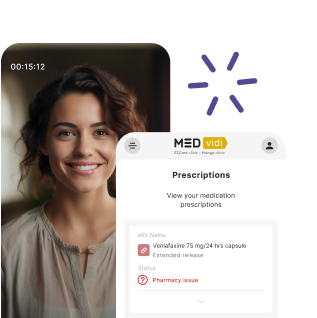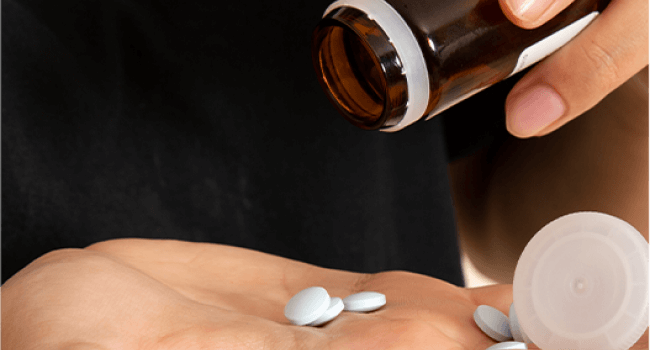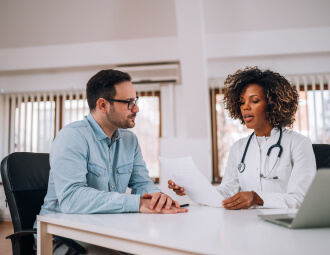Lexapro has a boxed warning, the most serious type of warning from the Food and Drug Administration (FDA). Lexapro’s active ingredient escitalopram has an increased risk of suicidal thoughts and behaviors in children, adolescents and young adults taking antidepressants for major depressive disorder (MDD) and other psychiatric disorders. Remember to discuss the risks with your healthcare provider.
Highlights
- Lexapro is a type of SSRI, a group of medications that are prescribed for depression, anxiety, and more.
- Lexapro is an FDA-approved medication which shows its safety, but it has precautions and can come with some side effects for some people. How and when you take Lexapro can help you manage those side effects.
- When to take Lexapro depends on the side effects you experience as well as what works best for your lifestyle. You can take Lexapro at any time of day, but it’s important to be consistent and follow your clinician’s instructions.
When you’re starting any new medication, you may have questions about how and when, exactly, to take it.
If you’ve recently been prescribed Lexapro, you might wonder what time of day is best to take it for the best effects. Fortunately, the timing of Lexapro is relatively simple. Unlike some other medications, you can take it at any time of day, with or without food — as long as you’re consistent.
Here’s everything you need to know about the best time of day to take Lexapro, including whether or not to take it with food and if it’s better to take it in the morning or at night.
Online help within 24 hours

How Lexapro Works and What Influences the Best Time to Take It
SSRIs, including Lexapro, work by
Lexapro has been shown to be an effective and safe medication, and it’s
- Nausea
- Drowsiness
- Insomnia
- Headache
- Sweating
If you experience unusual,
It’s important to follow your healthcare provider’s instructions closely to help make Lexapro work best for you and to avoid side effects as much as possible.
Timing doesn’t matter for Lexapro as much as consistency does.
Is It Better to Take Lexapro in the Morning or at Night?
The best time to take Lexapro for anxiety or depression depends on your unique symptoms and needs. Different things work for different people; you can choose to take Lexapro either in the morning or at night. The most important thing is to take it at the same time every day.
There are also some other factors to consider.
Taking Lexapro in the Morning
Many people choose to take Lexapro in the morning. This might be the best choice for you if:
- You have trouble sleeping at night. Lexapro can cause insomnia for some people, so if you’re having a hard time falling asleep, it might be best to take Lexapro in the morning.
- You’re having night sweats due to Lexapro. If you take Lexapro in the morning, you might sweat during the day, but many people find this more manageable.
- You feel nauseous when you take Lexapro on a full stomach. It may be easier to take Lexapro before having breakfast in the morning.
Taking Lexapro at Night
You can also choose to take Lexapro at bedtime. One of the main benefits of taking Lexapro at night is to avoid drowsiness during the day. This could be the right choice for you if:
- Lexapro makes you sleepy. For some people, Lexapro can cause drowsiness. If you’re experiencing this, then it may be best to take Lexapro before bedtime so you’re able to function better during the day. Drowsiness can also help you fall asleep if you usually have trouble sleeping.
One study[5] also found that escitalopram can be beneficial for managing sleep issues in people with major depressive disorder and anxiety. - It’s easier for you to take Lexapro with food. Some people find that they feel nauseous when they take Lexapro on an empty stomach, so it might work better for you to take it at night after dinner.
Switching From Morning to Night (or Vice Versa)
Typical recommendations are the following: if you’re switching Lexapro from night to morning, skip your night dose and take it in the morning the next day. If you want to switch from morning to night, skip your morning dose and take it that night. Don’t take a double dose of Lexapro within 24 hours; remember to discuss your willingness to change the schedule with your healthcare provider — they will offer you more personalized recommendations.
Tips for Getting the Best Results From Lexapro
Like many medications, it can take some trial and error to figure out how to make Lexapro work for you. Lexapro can take up to 3 months to fully start showing effects. So, if you’re finding it’s not effective right away, that doesn’t necessarily mean it’s the wrong medication. You may just need to try different things to make it work best for you.
Here are some things to consider to get the expected results.
Consistency
You can choose to take Lexapro at any time of day — in the morning, night, or afternoon. But it’s important to be as consistent as possible, and take it at the same time every day. This will help Lexapro work better for you. Being consistent with timing can also help you remember to take it every day.
Dosing
Your healthcare provider will likely start you on a lower dose of Lexapro, which you may need to increase over time, depending on your response to it and other factors. Slowly increasing the dosage can help minimize side effects. Your provider will let you know if they think you need to increase your dose (up to the maximum dose of 20 mg per day).
Always take the exact dose that you’re prescribed. You should never try to increase or decrease dosage on your own; this can come with uncomfortable and even dangerous effects.
Taking With Food
It’s okay to take Lexapro with or without food. Nausea is one of the most common side effects of Lexapro, affecting
Handling Missed Doses
If you accidentally miss a dose of Lexapro, take it as soon as you remember. But if it’s almost time to take your next dose, then just skip your missed dose and take it when it’s time again. Don’t take a double dose within one day. If you’re not sure what to do, contact your healthcare provider.
Avoiding Sudden Stopping
Never stop taking your SSRI without the supervision of your provider. Stopping an SSRI like Lexapro suddenly can lead to severe
When to Consult a Healthcare Provider
You can switch the time of day you take Lexapro without getting your doctor’s permission. But if you have any further questions about when to take Lexapro, if you’re experiencing uncomfortable side effects, or if you’re considering getting off Lexapro and taking another medication, consult with a healthcare provider before making any changes. Changing or stopping your Lexapro on your own can be dangerous.
Talking to a healthcare provider can give you reassurance that you’re doing things in a safe way.
Next Steps
If you think you may have depression or anxiety, Lexapro — or another antidepressant medication — could help, along with therapy. Depression and anxiety can be treated, and a mental health condition doesn’t have to control your life. There are so many treatment options that can help; if one medication or treatment doesn’t work, then you have other choices.
But it’s essential to work with a licensed and qualified healthcare provider who can listen to your concerns and make the best treatment decisions for your needs. At MEDvidi, you can connect with a provider online to get individualized treatment for anxiety and depression.













